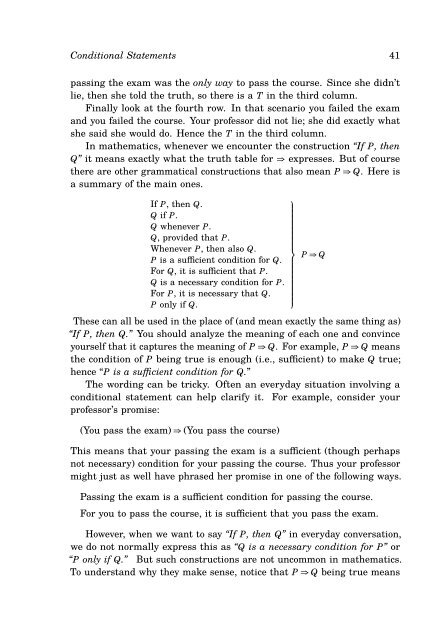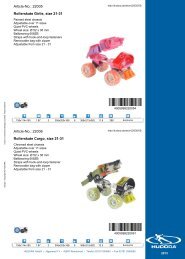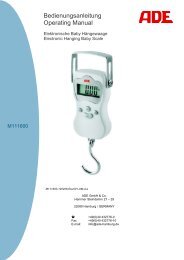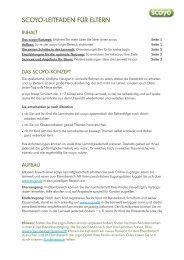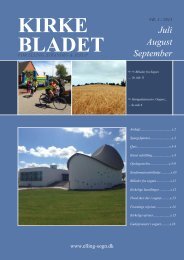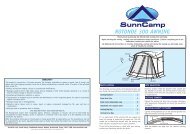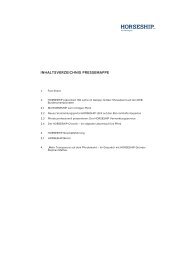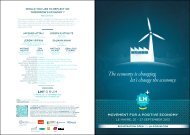- Page 1 and 2: Book of Proof Richard Hammack Virgi
- Page 3 and 4: To my students
- Page 5 and 6: v II How to Prove Conditional State
- Page 7 and 8: Preface In writing this book I have
- Page 9 and 10: ix The book is organized into four
- Page 11: Part I Fundamentals
- Page 14 and 15: 4 Sets Some sets are so significant
- Page 16 and 17: 6 Sets These last three examples hi
- Page 18 and 19: 8 Sets 1.2 The Cartesian Product Gi
- Page 20 and 21: 10 Sets We can also take Cartesian
- Page 22 and 23: 12 Sets This idea of “making” a
- Page 24 and 25: 14 Sets This is a subset C ⊆ R 2
- Page 26 and 27: 16 Sets y y y x x x (a) (b) (c) Fig
- Page 28 and 29: 18 Sets B A ∪ B A ∩ B A − B A
- Page 30 and 31: 20 Sets Example 1.7 If P is the set
- Page 32 and 33: 22 Sets We can also think of A ∩
- Page 34 and 35: 24 Sets 1.8 Indexed Sets When a mat
- Page 36 and 37: 26 Sets Example 1.11 Here the sets
- Page 38 and 39: 28 Sets 1.9 Sets that Are Number Sy
- Page 40 and 41: 30 Sets Russell’s paradox arises
- Page 42 and 43: 32 Logic In proving theorems, we ap
- Page 44 and 45: 34 Logic R(f , g) : The function f
- Page 46 and 47: 36 Logic 2.2 And, Or, Not The word
- Page 48 and 49: 38 Logic To conclude this section,
- Page 52 and 53: 42 Logic that it’s impossible tha
- Page 54 and 55: 44 Logic P if and only if Q. P is a
- Page 56 and 57: 46 Logic Notice that when we plug i
- Page 58 and 59: 48 Logic There are two pairs of log
- Page 60 and 61: 50 Logic Likewise, a statement such
- Page 62 and 63: 52 Logic 2.8 More on Conditional St
- Page 64 and 65: 54 Logic Example 2.9 Consider Goldb
- Page 66 and 67: 56 Logic Example 2.10 Consider nega
- Page 68 and 69: 58 Logic Example 2.13 Negate the fo
- Page 70 and 71: 60 Logic 2.12 An Important Note It
- Page 72 and 73: 62 Counting Occasionally we may get
- Page 74 and 75: 64 Counting To answer this question
- Page 76 and 77: 66 Counting we can choose any one o
- Page 78 and 79: 68 Counting 3.2 Factorials In worki
- Page 80 and 81: 70 Counting We close this section w
- Page 82 and 83: 72 Counting Definition 3.2 If n and
- Page 84 and 85: 74 Counting Fact 3.3 ( ( ) n n! n I
- Page 86 and 87: 76 Counting 3.4 Pascal’s Triangle
- Page 88 and 89: 78 Counting coefficients 1 2 1. Sim
- Page 90 and 91: 80 Counting We seek the number of 3
- Page 92 and 93: 82 Counting 5. How many 7-digit bin
- Page 95 and 96: CHAPTER 4 Direct Proof It is time t
- Page 97 and 98: Definitions 87 4.2 Definitions A pr
- Page 99 and 100: Definitions 89 it necessary to defi
- Page 101 and 102:
Direct Proof 91 So the setup for di
- Page 103 and 104:
Direct Proof 93 Here is another exa
- Page 105 and 106:
Direct Proof 95 This proposition te
- Page 107 and 108:
Treating Similar Cases 97 Propositi
- Page 109 and 110:
Treating Similar Cases 99 19. Suppo
- Page 111 and 112:
Contrapositive Proof 101 Since P
- Page 113 and 114:
Congruence of Integers 103 Proposit
- Page 115 and 116:
Mathematical Writing 105 Propositio
- Page 117 and 118:
Mathematical Writing 107 Since a |
- Page 119 and 120:
CHAPTER 6 Proof by Contradiction We
- Page 121 and 122:
Proving Statements with Contradicti
- Page 123 and 124:
Proving Conditional Statements by C
- Page 125 and 126:
Some Words of Advice 115 for intege
- Page 127:
Part III More on Proof
- Page 130 and 131:
120 Proving Non-Conditional Stateme
- Page 132 and 133:
122 Proving Non-Conditional Stateme
- Page 134 and 135:
124 Proving Non-Conditional Stateme
- Page 136 and 137:
126 Proving Non-Conditional Stateme
- Page 138 and 139:
128 Proving Non-Conditional Stateme
- Page 140 and 141:
130 Proofs Involving Sets Generally
- Page 142 and 143:
132 Proofs Involving Sets In practi
- Page 144 and 145:
134 Proofs Involving Sets Example 8
- Page 146 and 147:
136 Proofs Involving Sets Thus, sin
- Page 148 and 149:
138 Proofs Involving Sets Though it
- Page 150 and 151:
140 Proofs Involving Sets If we add
- Page 152 and 153:
142 Proofs Involving Sets so that d
- Page 154 and 155:
CHAPTER 9 Disproof E ver since Chap
- Page 156 and 157:
146 Disproof deciding whether a sta
- Page 158 and 159:
148 Disproof Example 9.2 Conjecture
- Page 160 and 161:
150 Disproof 9.3 Disproof by Contra
- Page 162 and 163:
CHAPTER 10 Mathematical Induction T
- Page 164 and 165:
154 Mathematical Induction This pic
- Page 166 and 167:
156 Mathematical Induction To round
- Page 168 and 169:
158 Mathematical Induction Proposit
- Page 170 and 171:
160 Mathematical Induction Strong i
- Page 172 and 173:
162 Mathematical Induction Proposit
- Page 174 and 175:
164 Mathematical Induction We next
- Page 176 and 177:
166 Mathematical Induction Proposit
- Page 178 and 179:
168 Mathematical Induction 13. For
- Page 181:
Part IV Relations, Functions and Ca
- Page 184 and 185:
174 Relations The set R encodes the
- Page 186 and 187:
176 Relations Exercises for Section
- Page 188 and 189:
178 Relations Example 11.7 Here A =
- Page 190 and 191:
180 Relations Example 11.8 Prove th
- Page 192 and 193:
182 Relations 11.2 Equivalence Rela
- Page 194 and 195:
184 Relations We close this section
- Page 196 and 197:
186 Relations 11.3 Equivalence Clas
- Page 198 and 199:
188 Relations Notationally, the uni
- Page 200 and 201:
190 Relations In a similar vein, [2
- Page 202 and 203:
192 Relations Exercises for Section
- Page 204 and 205:
CHAPTER 12 Functions You know from
- Page 206 and 207:
196 Functions value a to the output
- Page 208 and 209:
198 Functions To answer this, first
- Page 210 and 211:
200 Functions For more concrete exa
- Page 212 and 213:
202 Functions To see that g is surj
- Page 214 and 215:
204 Functions Although the underlyi
- Page 216 and 217:
206 Functions 12.4 Composition You
- Page 218 and 219:
208 Functions Proof. First suppose
- Page 220 and 221:
210 Functions A B a 1 a 1 b 2 b 2 c
- Page 222 and 223:
212 Functions We can check our work
- Page 224 and 225:
214 Functions If you continue your
- Page 226 and 227:
216 Cardinality of Sets On the othe
- Page 228 and 229:
218 Cardinality of Sets There is a
- Page 230 and 231:
220 Cardinality of Sets And saying
- Page 232 and 233:
222 Cardinality of Sets Here is a s
- Page 234 and 235:
224 Cardinality of Sets Beginning a
- Page 236 and 237:
226 Cardinality of Sets Exercises f
- Page 238 and 239:
228 Cardinality of Sets f : A → P
- Page 240 and 241:
230 Cardinality of Sets 13.4 The Ca
- Page 242 and 243:
232 Cardinality of Sets and the whi
- Page 244 and 245:
234 Cardinality of Sets Here are so
- Page 246 and 247:
236 Cardinality of Sets On the face
- Page 248 and 249:
Solutions Chapter 1 Exercises Secti
- Page 250 and 251:
240 Solutions Sketch the following
- Page 252 and 253:
242 Solutions 5. Sketch the sets X
- Page 254 and 255:
244 Solutions Section 1.8 1. Suppos
- Page 256 and 257:
246 Solutions Section 2.4 Without c
- Page 258 and 259:
248 Solutions 7. P ⇒ Q = (P∧
- Page 260 and 261:
250 Solutions Section 2.10 Negate t
- Page 262 and 263:
252 Solutions (b) How many such cod
- Page 264 and 265:
254 Solutions 5. How many 7-digit b
- Page 266 and 267:
256 Solutions 15. If n ∈ Z, then
- Page 268 and 269:
258 Solutions 7. Proposition Suppos
- Page 270 and 271:
260 Solutions 27. If a ≡ 0 (mod 4
- Page 272 and 273:
262 Solutions 7. If a, b ∈ Z, the
- Page 274 and 275:
264 Solutions This expresses a 3 +
- Page 276 and 277:
266 Solutions 19. If n ∈ N, then
- Page 278 and 279:
268 Solutions Chapter 8 Exercises 1
- Page 280 and 281:
270 Solutions 19. Prove that {9 n :
- Page 282 and 283:
272 Solutions 3. If n ∈ Z and n 5
- Page 284 and 285:
274 Solutions 25. For all a, b, c
- Page 286 and 287:
276 Solutions 5. If n ∈ N, then 2
- Page 288 and 289:
278 Solutions (2) Now assume the st
- Page 290 and 291:
280 Solutions 23. Use induction to
- Page 292 and 293:
282 Solutions Thus, with n + 1 line
- Page 294 and 295:
284 Solutions a b a b a b a b a b a
- Page 296 and 297:
286 Solutions Therefore 3x − 5z i
- Page 298 and 299:
288 Solutions Chapter 12 Exercises
- Page 300 and 301:
290 Solutions 13. Consider the func
- Page 302 and 303:
292 Solutions Section 12.5 Exercise
- Page 304 and 305:
294 Solutions 13. Let f : A → B b
- Page 306 and 307:
296 Solutions 11. Partition N into
- Page 308 and 309:
298 Solutions 7. Prove or disprove:
- Page 310 and 311:
300 Index notation, 197 one-to-one,


